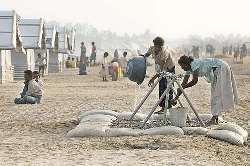What International Humanitarian Law says About Water

Contact: Antonella Notari, Head of Media Services / Spokesperson, International Committee of the Red Cross, (+4122) 730 2282, (+4179) 217 3280 cell, anotari.gva@icrc.org
MEDIA ADVISORY, Mar. 22 /Standard Newswire/ -- In an interview for the website, International Committee of the Red Cross legal adviser Jean-Marie Henckaerts explains how international humanitarian law provides special protection for life-giving water resources.
- Until about the 1960s, water-related conflicts arose mostly from disputes relating to navigable waterways and the law of the sea. How does the subject of water figure in present-day conflicts?
Access to water is increasingly a factor in the outbreak of armed conflicts. During conflicts, water resources may be denied to civilian populations for various reasons, including to starve them or to displace them. Today, armed conflicts are depriving millions of persons of drinking water. When water reserves are contaminated, damaged or destroyed, the results can be disastrous – thirst, dehydration and disease are added to the misery of war. For the ICRC, helping victims of war to access drinking water is a top priority.
- Broadly speaking, how does international humanitarian law protect water resources?
In essence, water is a civilian object and, as such, protected by humanitarian law. But in addition, water is indispensable for the survival of the civilian population. Hence, it has been granted special protection, including water sanitation and distribution installations.
- Are there areas where change is under way regarding protection of water in the realm of humanitarian law and case law? The International Criminal Court for example? In other words, is it a war crime to attack people's water?
Attacks against civilian objects and, in particular, against objects that are indispensable for the survival of the civilian population are war crimes. So far there have been no prosecutions before international courts and tribunals for attacks against water installations but the option clearly exists.
- Big risks are often taken by engineers – ICRC engineers for example – who repair water-supply installations during conflict. How are they protected under humanitarian law? Are they similar to medical staff in that respect?
They are humanitarian relief personnel and, as such, must be respected and protected. In addition, attacks against personnel displaying the distinctive emblems (red cross, red crescent, red crystal) are war crimes.
Photo: Displaced persons camp in Kiran, Batticaloa. The ICRC distributed drinking water on a daily basis and built latrines and showers. © ICRC / Dominic, Hi-resolution version available.




 Sign Up to Receive Press Releases:
Sign Up to Receive Press Releases: